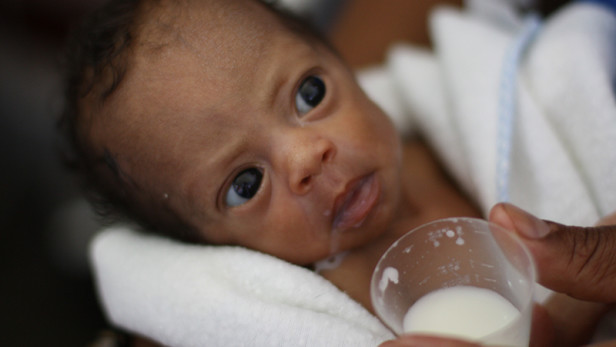Earlier this year the Lancet described breast-feeding as the “most specific personalized medicine” babies are ever likely to receive. But what the Lancet didn’t say was how vital breast milk is for the most vulnerable babies: the 22 million born too small, the 15 million born too soon, the 8 million born with congenital defects, and the 47 million born in fragile settings every year.
For these babies, breast milk is often one of the few lifesaving “medicines” available. This is why reports of lack of access to breast milk for this vulnerable population are so disturbing and warrant the urgent attention of global and national health authorities.
The theme of this year’s World Breastfeeding Week — August 1-7 — is “Breastfeeding: A Key to Sustainable Development.” This is the time for all global and national health authorities to acknowledge that optimal access to breast milk for sick and vulnerable newborns is critical to achieving the Sustainable Development Goals, especially ending child malnutrition (Goal 2) and reducing newborn deaths and deaths from noncommunicable diseases (Goal 3).
Stories from the field
My colleague Diane Spatz, director of lactation at the Children’s Hospital of Philadelphia, recently toured neonatal and intensive care units in India. She described the breast milk situation as “dire.” None of the infants were receiving breast milk exclusively; none of the hospitals had access to hospital-grade breast pumps; and only one had access to donor breast milk. Diane told me newborns commonly receive infant formula as a first feed, and none of the mothers were producing a normal milk supply.
Another colleague, Debbie Lester, director of clinical programs for Adara Development, observed mothers in a central Ugandan hospital struggling to establish and maintain milk supply for babies born with congenital anomalies. She told me the stigma attached to disability puts these babies at further risk when they return home. In one instance, Debbie said, the mother was so ashamed that she left her baby with her elderly mother, who had no option but to feed the baby diluted cow’s milk. Two years later the toddler is clearly developmentally delayed, not yet crawling, and suffering from bedsores from lying down for long periods.
I recently interviewed a pediatrician who works in Syrian refugee camps on the Turkish border, where he estimates the rate of exclusive breastfeeding is 5 percent. Prior to the crisis, most Syrian babies were formula-fed, he said, and mothers were initially able to get infant formula at no cost from humanitarian agencies. But when a United Nations agency alerted the Turkish government that the free distribution of formula violated the International Code of Marketing of Breast Milk Substitutes, the government issued cash instead so mothers could purchase formula themselves. However, instead of buying formula they reverted to feeding their babies “traditional foods” such as sugar bread, black tea, and rice powder, with potentially disastrous consequences for vulnerable newborns.
I asked several humanitarian agencies working in the refugee camps about feeding practices for sick and vulnerable newborns. They said they don’t routinely collect information on newborn feeding, nor do they monitor babies born too soon or too small. This isn’t surprising: most major breast-feeding policies and programs, such as the International Code of Marketing of Breast Milk Substitutes, the Baby-Friendly Hospital Initiative, and the Alive and Thrive Initiative have not prioritized sick and vulnerable newborns.
Change is in the air
This June, Laerdal Global Health launched the “Helping Babies Grow” family of training and therapy products to save newborn lives through breast-feeding and skin-to-skin contact. The products include tools for hand breast milk expression, a mannequin for newborn care training, a special cup for feeding breast milk to babies who can’t suckle, and a wrap to promote skin-to-skin care.
The All India Institute of Medical Science recently released results of an experiment that increased breast-feeding in their neonatal intensive care units from 12 percent to 83 percent in just four weeks through use of an education and training program and technologies that enable pumping.
In Uganda, Adara Development is partnering with the Cerebral Palsy Alliance and the London School of Hygiene and Tropical Medicine to teach hospital staff how to feed preterm babies, especially those with disabilities. Physical therapists will screen babies for disability, and families will be supported to participate in early childhood programs to reduce the stigma.
Finally, UNICEF and Save the Children are testing a Field Guide for Newborn Health in Humanitarian Settings in Jordan and South Sudan. The guide prioritizes access to breast milk for newborns and offers practical guidance on how to feed babies when breastfeeding is not an option.
But this is not enough.
If I had one wish for this week, it is that authorities would announce the world’s first independent assessment of how sick and vulnerable newborns are being fed across several populations with the highest rates of newborn death, especially in sub-Saharan Africa and South Asia. We need to know how the newborns at greatest risk of death are being fed in hospital NICUs, in maternity facilities without any special facilities for newborns, and in refugee settings.
The assessment should make specific recommendations to governments and other stakeholders for how to improve the nutritional status of sick and vulnerable newborns.
Ultimately, however, little will change until governments set ambitious goals for optimal feeding of sick and vulnerable newborns and invest in programs that make sure these babies have access to the most lifesaving — and too often the only — “medicine” available: breast milk.

